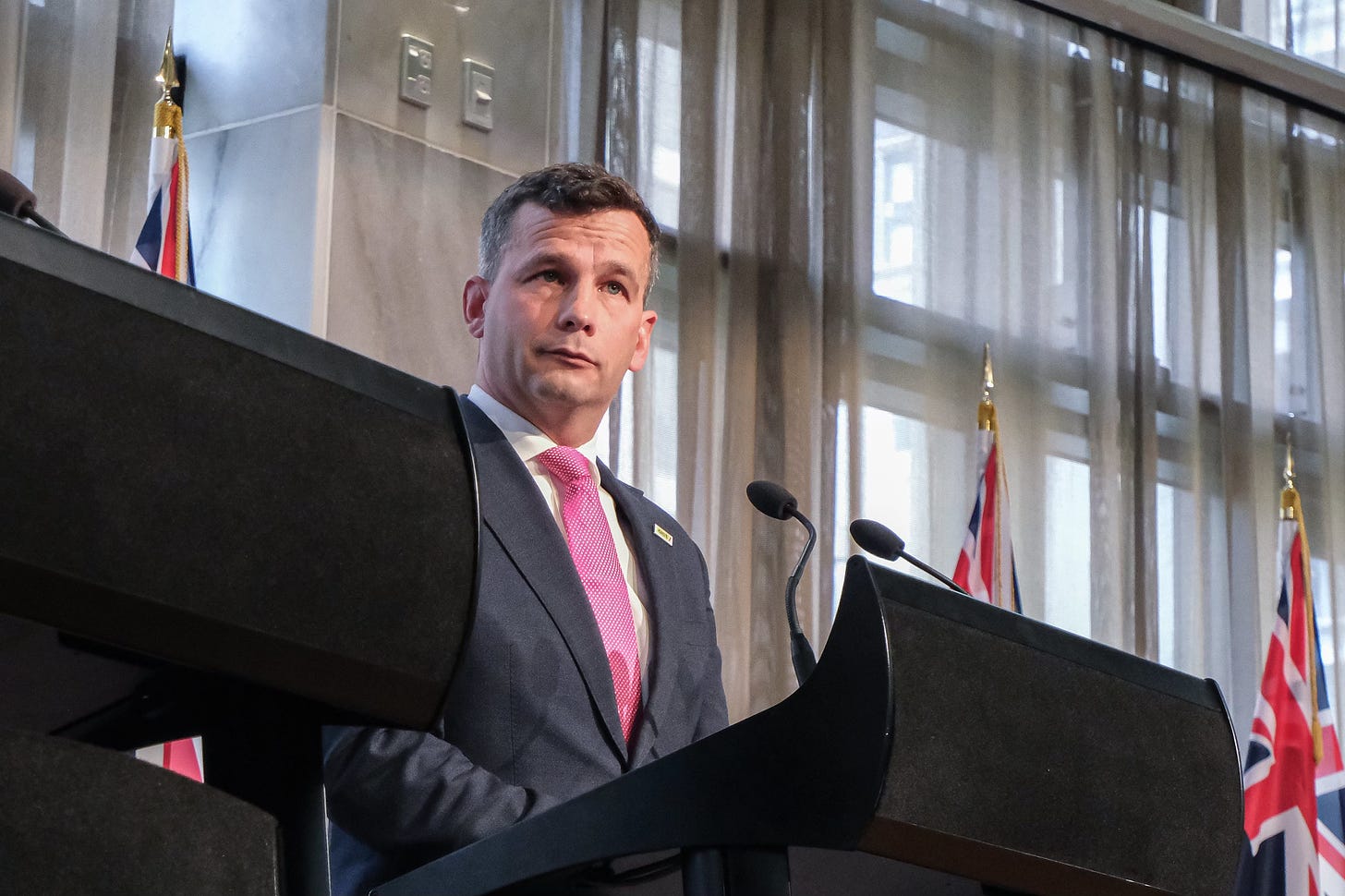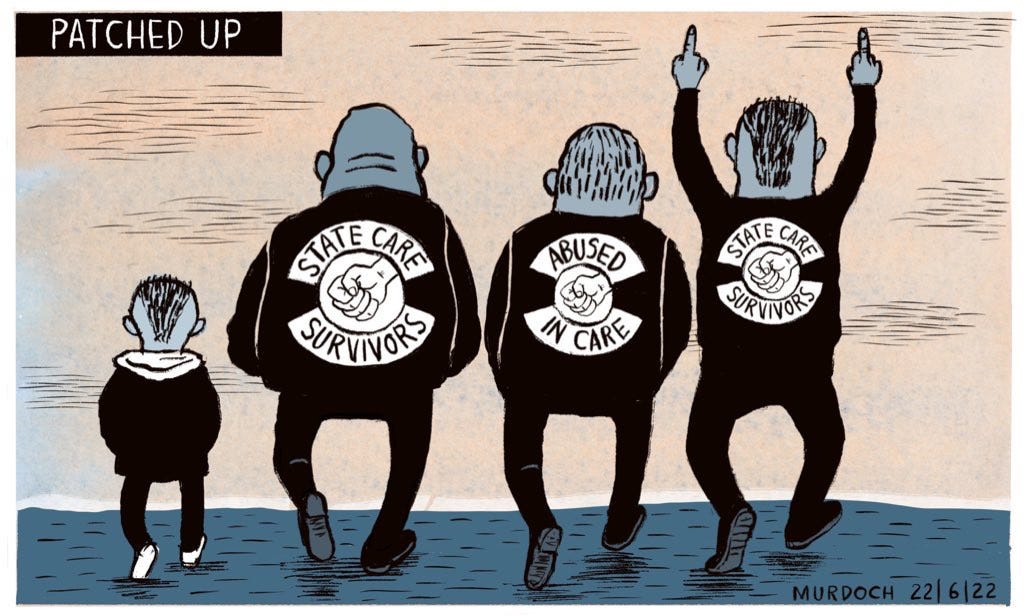
Kia ora. Long stories short, here’s my top things to note in Aotearoa’s political economy around housing, climate and poverty on Friday, November 22:
The news overnight: Russia fires a very long range non-nuclear ballistic missile into Ukraine for the first time overnight. Matt Gaetz drops his bid to be US Attorney General. The US DoJ tells Google to sell Chrome and look at selling Android to improve competition. A Cook Strait ferry decision is due in three weeks. Wellington Airport plans to invest $500 million to bring in long-haul flights. David Seymour criticises National’s plan for Waikato University Medical School.
The lead: On the same day economists told the Government its budget cuts were hurting the economy, Treasury warned the recession was worsening and widening the Budget deficit. Chris Bishop said Nicola Willis would ignore the economists’ views, although he also said he wouldn’t be a slave to getting a surplus.
Scoop du jour: To save money now and avoid a credit rating downgrade, Wellington City Council is looking at delaying social housing maintenance for eight years. The Post’s Harriet Laughton
Deep-dive du jour: Karina Cooper reports this morning for the Northern Advocate on an epidemic of loneliness among the elderly in Northland.
Solutions news: Companies Act reforms going through Parliament should include environmental and social considerations in corporate governance, say University of Auckland experts. RNZ
Editorial Opinion du jour: Matthew Hooton writes in his NZ Herald-$$$ column this morning that PM Christopher Luxon is “completely out of his depth”.
(There is more detail, analysis and links to documents below the paywall fold and in the podcast above for paying subscribers. Normally, if we get over 100 likes we’ll open it up for public reading, listening and sharing, but in this case I’ve pre-emptively opened it up, given the public interest in the The Lead.)
The News @ 7.30 am
ACT Leader David Seymour has opened a split in the coalition over the future of National’s promise to build a new medical school at Waikato University. He criticised the plan heavily in documents reported on by RNZ’s Phil Pennington, NZ Herald-$$$’s Thomas Coughlan and the ODT-$$$’s Tim Scott.
Russia fired an intermediate range ballistic missile (without a nuclear warhead) into Ukraine for the first time overnight. Reuters
Matt Gaetz dropped out overnight as Donald Trump’s nominee for Attorney General after a new allegation about his relations with a 17-year-old emerged. Reuters
The US Department of Justice told Google overnight to sell Chrome and look at selling Android to improve competition. Reuters
The International Criminal Court issued arrest warrants overnight for Benjamin Netanyahu, Israel’s former Defence Minister and a (somehow still alive) Hamas leader. Reuters
Winston Peters said yesterday a Cook Strait ferry decision was due in three weeks (Dec 11). The Post/NZ Herald
Wellington Airport yesterday proposed investing $500 million to bring in long-haul flights from San Francisco, Tokyo and Hong Kong, including new technology to make the runway safer for bigger planes. The Post’s Tom Hunt/ NZ Herald-$$$’s Grant Bradley
The Lead: When cuts beget cuts
Treasury’s Chief Economist Dominick Stephens warned yesterday the recession was worsening to be deeper than the one seen in the Global Financial Crisis and widening the Budget deficit. His comments echoed those of a group of 15 economists who yesterday called for a suspension to Government spending cuts, saying they weren’t needed and were creating a negative feedback loop of economic contraction.
Stephens couldn’t have been clearer:
Economic growth has proved slower than anticipated. Weaker economic growth means a smaller economy and less tax revenue, increasing the challenge for the Government in balancing its books. Treasury’s Chief Economist Dominick Stephens in a speech to the Chartered Accountants Australia and New Zealand (CAANZ) Annual Tax Conference.
Responding to the letter from the economists and questions about Treasury’s warning, Chris Bishop said Nicola Willis would ignore the economists’ views because many were connected to the Labour, although he also said he wouldn’t be a slave to getting a surplus.
“We’re not going to be a slave to a surplus,” Bishop told the Herald when asked to comment on the Treasury warning the economy is proving to be weaker than expected.
“We are committed to getting the Government books back in order, but fixating on a particular date or a particular time is the wrong way to go about it,” Bishop said.
“What’s important is the fiscal track in the medium to long term.” Bishop via NZ Herald-$$$’s Thomas Coughlan
Did the tax cuts for the wealthy reduce spending & GST?
Stephens went into more depth in his speech about the slowdown, noting in particular weaker-than-expected GST receipts, which would be consistent with tax cuts meaning more income was going to those on higher incomes and less likely to spend all their income. Here’s Stephens’ comments (bolding mine):
The latest data suggests that economic activity has been weaker than anticipated in Treasury’s Budget 2024 forecasts, hinting at trend productivity growth having slowed even further than assumed at Budget.
The Treasury has long been forecasting an economic downturn, and this has come to pass. Since the September quarter of 2022, per capita GDP has fallen by 4.6%, making this a larger per-capita recession than the Global Financial Crisis of 2008-2010 .
The Treasury forecasts have also long anticipated a recovery. As interest rates fall, we expect household spending and business activity to lift. Businesses appear to share our expectation – the latest NZIER Quarterly Survey of Business Opinion (QSBO) showed that firms’ expectations for future trading activity have improved markedly.
However, recent data has suggested that the economic downturn has been deeper, and the recovery may begin later, than the Treasury forecast at Budget 2024.
At the same time as this weaker economic activity, we have seen growth in hours worked fall only slightly. This suggests that trend productivity growth may have been even weaker than anticipated in our Budget forecasts. Of course, one should always read real-time data with caution, but this presents further downside risk to the Treasury’s economic growth and tax revenue forecasts.
Quite separately from the economic outlook, there has been a second reason that the Treasury has been revising its revenue forecasts lower. Tax revenue has proven lower than expected given the state of the economy in recent economic and fiscal updates. Recent monthly data has shown that tax revenue overall has been close to the Treasury’s Budget forecast, but the detail reveals that GST collections have been surprisingly low relative to underlying economic activity. If this trend continues, there could be further downside risks to the Treasury’s revenue forecasts. Dominick Stephens in a speech
Scoop du jour: Airport tech before housing maintenance
To save money now and avoid an embarrassing (but not expensive) credit rating downgrade, Wellington City Council is looking at delaying social housing maintenance for eight years, The Post’s Harriet Laughton reports this morning.
Coincidentally, Wellington Airport announced plans for $500 million of investment in technology and marketing to bring long-haul flights to the capital. The Council owns 34% of the Airport and would have to contribute if new capital was needed.
Here’s the detail in Harriet’s article (bolding mine):
The overall savings from the recommended off-setting of the social housing upgrades would be $61.3 million. It would feed into the $500m council needs to make up to address its under-insurance gap, and create a disaster fund.
The council currently houses more than 3000 tenants across 1900 homes through housing provider Te Toi Mahana.
The deferred upgrades included work like seismic strengthening, insulation, ventilation, fencing, lighting and upgrades of kitchens, storage and laundry facilities. It was work council was legally liable to undertake as part of its signed Deed of Grant with the Government, which the Government funded $220m for back in 2007.
The criteria was for council to remain a social housing provider until at least 2037, and upgrade its housing portfolio to modern standards. The Post’s Harriet Laughton
Perhaps not coincidentally, the $61.3 million is about a third of the proportional contribution from the Council towards the Airport investment upgrade.
However, Mayor Tory Whanau wants to avoid the housing maintenance delay.
The deferral is on a list of capital programmes council staff recommended be cut, reduced or deferred ahead of next Thursday’s long-term plan vote.
Wellington mayor Tory Whanau said it was ultimately up to councillors to decide where the savings come from, but she intended to put up an amendment to have the recommendation removed.
“This will mean tenants can get the safe, dry homes they deserve.”
Social housing is one of the “non-negotiables” Whanau underlined as her priorities to not be cut after the sale of the council’s airport shares fell through.
The vote on the cost savings is next Thursday.
Deep-dive du jour: Elderly loneliness
Karina Cooper reports this morning for the Northern Advocate on an epidemic of loneliness among the elderly in Northland, which is closely connected to high poverty levels. A sample:
A woman in her 90s who had not left her home in three years. Another pensioner who went three weeks without seeing anyone. These are just some of the experiences of Northland’s lonely seniors.
According to Age Concern, loneliness among people 65 and over is at epidemic levels. A study commissioned by the charitable organisation’s Auckland branch found 59% of people surveyed had felt lonely or socially isolated – 30% of whom experienced those feelings often or always.
Moebus said it was a familiar story across the region. A lot of the time older people moved north to be with family, only to have whānau leave the area. Medical problems, lack of transport and age prevented older Northlanders from connecting with others.
Victoria University professor emeritus Dr Philip Morrison, an expert in loneliness across ages, said there was a strong relationship between loneliness and income.
“Loneliness rises as income falls.”
That’s a concern for Northland, given an NZIER report released this year showed the region’s median income at $378 per week in 2023 was the lowest in New Zealand. The Northern Advocate’s Karina Cooper
Solutions news:
Companies Act reforms going through Parliament should include environmental and social considerations in corporate governance, say University of Auckland experts. RNZ
Column du jour: ‘PM out of his depth’
Matthew Hooton writes in his NZ Herald-$$$ column this morning that PM Christopher Luxon is “completely out of his depth.” A sample (bolding mine):
Like Ricky Gervais’ David Brent, Christopher Luxon has an unfounded sense of his own personal charm, while also running down his colleagues behind their backs.
His lack of understanding of the National Party means he fails to appreciate that everything he says about another MP soon gets back to them.
However, Luxon’s lack of understanding of New Zealand, partly but not solely because he lived abroad from 1995 to 2011, is more serious.
Hooton makes a good point about how Luxon was away during the difficult debates over Foreshore and Seabed and Don Brash’s Orewa, and the healing that followed.
The principles of the Treaty of Waitangi, which had been clearly defined by the Court of Appeal and Privy Council a quarter-century earlier, were deeply embodied in the law and practice.
There was a rough bipartisan consensus over climate change policy.
Across all these policy areas, Luxon seems to have no appreciation of how difficult progress had been, nor how fragile, especially for a small, isolated, agrarian economy.
That may not have mattered, except Luxon appeared to demonstrate little if any curiosity about the country he wanted to lead. The casual observer might conclude that he considered that if he didn’t already know something, it wasn’t worth bothering with.
His record at Air New Zealand was mixed. He failed to forge a strong network even in the Auckland business community, let alone more broadly.
Hooton also makes a good point about Luxon’s lack of a credible strategy.
Luxon’s language is often derided as business-speak, but no genuine businessperson uses so much corporate twaddle. His language more resembles a cheap self-help book.
Extraordinarily, he communicates even less substantively in the media and in person than the lamentable Dame Jacinda Ardern.
Worse, if Luxon genuinely believes New Zealand’s long-term fiscal and health crises can be resolved through much-needed cost-cutting in Wellington alone, then he is as innumerate as he seems illiterate.
Arguably, Clark and Key had the knowledge, intelligence and personal attributes to chart a middle path between China and the US, but Luxon shows no sign of it.
Neither Xi Jinping nor Donald Trump is likely to be remotely influenced by a clutch of the shoulder, a Luxon grin and trite sloganeering, except negatively.
Yet the Treaty of Waitangi and race relations are the areas where Luxon’s lack of history, understanding and foresight threaten the greatest harm.
Luxon can’t say he wasn’t warned, including by every living National Party Prime Minister and more broadly, that his handling of Act’s Treaty Principles Bill was wrong-headed, and could benefit only Act and Te Pāti Māori, while severely damaging both New Zealand’s social cohesion and National’s electoral interests. Matthew Hooton via his NZ Herald-$$$ column.
The Kākā’s Journal of Record for Friday, November 22
Infrastructure & councils: Cabinet invited all regions to propose Regional Deals between central and local government, with the goal of finalising the first deal by December 2025. Local Government Minister Simeon Brown said he expected councils to produce "practical and focused" proposals for key infrastructure, including housing and roads. The Press
Housing & infrastructure: A Bill to extend the remediation deadline for earthquake prone buildings by four years passed its third reading, Building & Construction Minister Chris Penk announced. The Government has also appointed an independent chair and advisory group to provide advice on making earthquake building settings "fairer" and "more sensible". The Post
Economy & politics: The Treasury is likely to downgrade its upcoming economic and fiscal forecasts, Chief Economic Advisor Dominick Stephens said in a speech, citing evidence of a "sustained productivity slowdown". Stephens said the 4.7% fall in per-capita GDP since the 2022 September quarter mad this recession larger per-capita than the Global Financial Crisis. BusinessDesk
Poverty: Child Poverty Reduction Minister Louise Upston released the Government's 2024-2027 Child & Youth Strategy. The Green Party said the new strategy removed food insecurity and mould and damp in houses from its list of child poverty indicators targeted for reduction efforts, and has removed child mental wellbeing as a priority focus. RNZ
Climate: The Labour Party noted that NZ fell seven places on the annual Climate Change Performance Index, an independent research project monitoring countries' climate change mitigation efforts. Denmark ranks highest among the 67 countries included and Iran and Saudi Arabia rank the lowest. NZ now ranks 41st. Newsroom
Electricity: Powerswitch manager Paul Fuge said although the average monthly power bill will increase by $10 due to the Commerce Commission's move to increase Transpower's revenue limits, the exact price increase will vary between different parts of the country to up to $25. Fuge said sustained high wholesale electricity prices are also likely to result in further power bill increases.
Cartoon du jour: Labels through the generations

Timeline-cleansing nature pic of the day: Blooming red
Ka kite ano
Bernard












Share this post